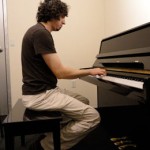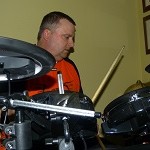POSTURE is Paramount
Like all physical activity, it is important that you maintain good posture while you learn to play piano. Failure to do so can result in a number of complications, some of which can be painful (ex: wrist strain and injuring the tendons in your hand and forearm). To prevent this, ensure that you sit upright and at the edge of your piano stool or chair (to prevent slouching). In addition, make sure that there is enough distance between you and the piano keys. This range depends on the length of your arm, how tall you are, and the width of your hands. A general rule of thumb is to never allow your wrists to droop or rest against the edge of the piano. Use only the tips of your fingers to press the piano keys, and when appropriate, allow yourself to move your entire arm when playing. Stay as relaxed as possible; performing or practicing while stiff will only impede you.
You’ve got to BREATHE
Believe it or not, playing any instrument – especially the piano – is a full body commitment. However, when we focus actively and intently while performing or practicing, studies have shown that we have tendencies to forget to breathe. While this is not completely unavoidable, it is certainly controllable. As you play, make conscious efforts to take slow breaths through your nose and exhale out of your mouth, similar to how you would while running long distances or doing other highly physical activities.
The result of this keeps your mind sharp, your body relaxed, your energy levels high, and your attitude positive.
Have FUN While You Practice
Musicians at various skills levels – be they beginner students or working professionals – forget the fun that can come through routine practicing. More often than not, people approach practicing as a chore they must complete to stay sharp at their instrument.
When you practice, remember that you are taking time to cultivate your craft; you are gradually pushing past boundaries once thought impossible to overcome. Through this accomplishment, you’ll discover amazing things about yourself while creating something wonderful in the process. This is not to imply that practicing does not require work or diligence. However, this ‘work’ can be tempered by two things: First, accept where you are in skill and strive to become better. No matter where you are in skill, there’s always room for improvement. Remind yourself it won’t happen overnight, but look forward to the journey you’ll go through get where you want to be. Second, shape your practice sessions in ways that make you happy. Make a game out of learning your scales. Time yourself on how long it takes you to play a simple melody line by ear alone, and once you’ve proficiently replicated it, perform it in another key. The options are endless and the difficulty can vary based on your imagination; the only thing that must stay constant is your attitude and your desire to grow.
Stay tuned for more piano tips!
~ Adam Williams (Music By Ross Instructor – Voice and Piano)







